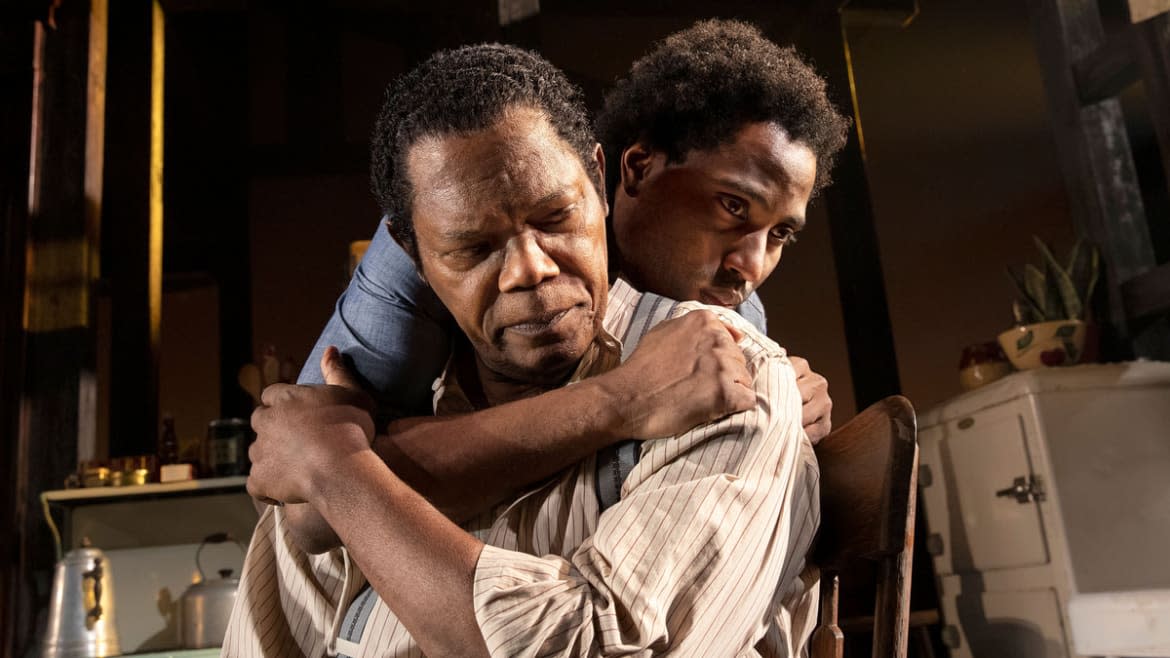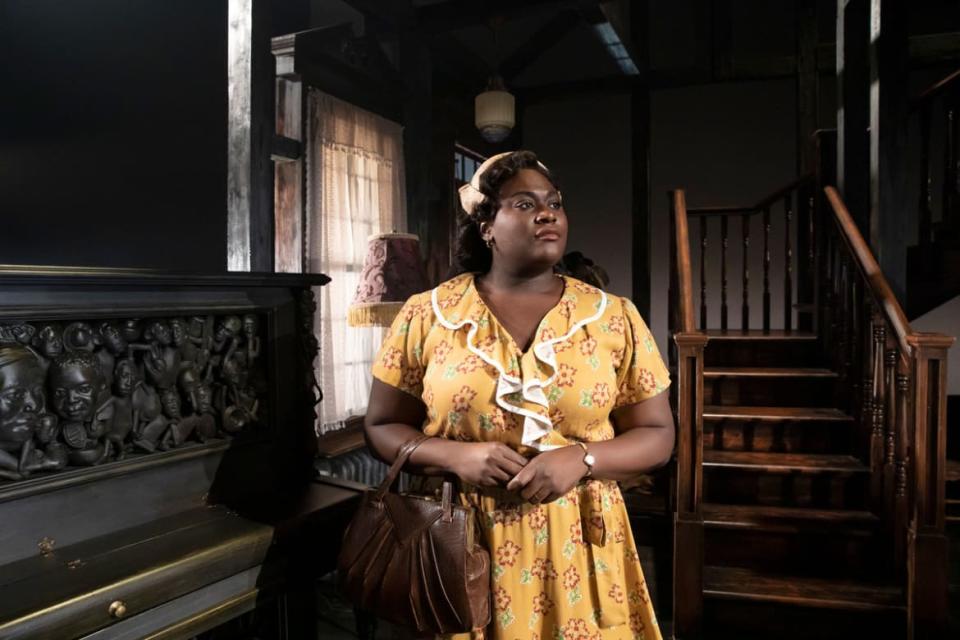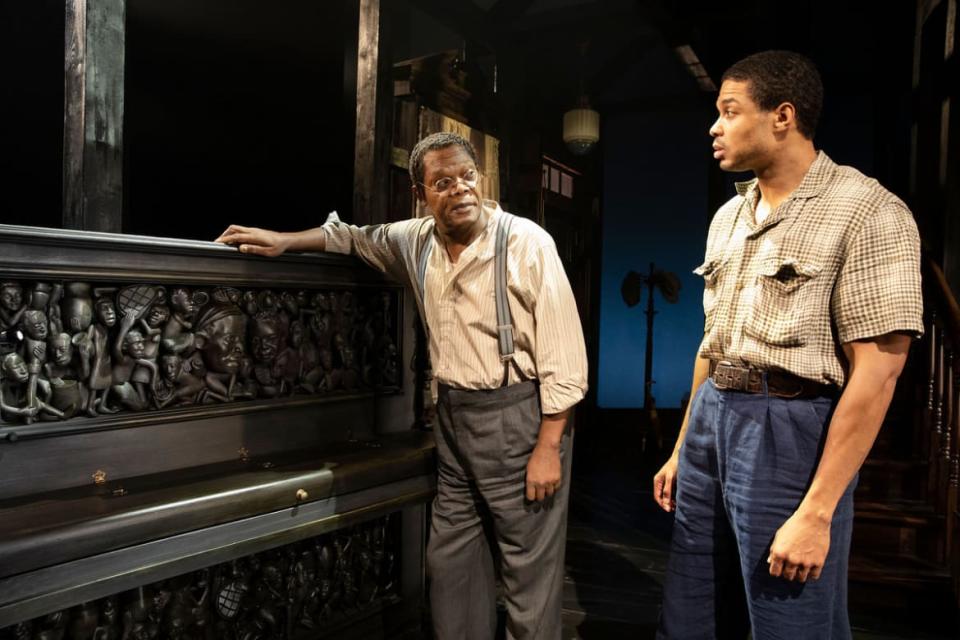Samuel L. Jackson and Danielle Brooks Give a Broadway Masterclass in ‘The Piano Lesson’

- Oops!Something went wrong.Please try again later.
- Oops!Something went wrong.Please try again later.
- Oops!Something went wrong.Please try again later.
An exquisite revival of August Wilson’s The Piano Lesson (Ethel Barrymore Theatre, opening tonight until Jan. 15) is pure dramatic pleasure—a richly involving play, beautifully staged, costumed, played, and directed (by Latanya Richardson Jackson) on a grandly decked-out Broadway stage.
The play, which won the 1990 Pulitzer Prize for Drama, is the fourth installment in Wilson’s epic, 10-play “Pittsburgh Cycle” most of which is set in the Hill District, the Black neighborhood of the playwright’s native city. It is 1936, and we are in the home of Doaker Charles (Samuel L. Jackson). Beowulf Boritt’s set is a character in itself, a vertical slice through Doaker’s house, so we see living room, kitchen, rafters, and a section of upstairs. Look closely, and you see not everything is joined up. The home is fractured in more than one way.
How August Wilson Heard Black America: The Brilliance of ‘Jitney’ on Broadway
Doaker’s niece Berniece (Danielle Brooks) lives in the house with her uncle and her 11-year-old daughter Maretha (Jurnee Swan), their peace shattered by the arrival of her brother Boy Willie (John David Washington) and his friend Lymon (the excellent Ray Fisher), who are in town to sell watermelons. And there, stage left, is a piano carved in great detail with the outlines of faces and bodies—the cause, in both past and present, of the fractured rafters. Boy Willie wants to sell the piano, while Berniece fiercely wants it to stay where it is, even if she cannot bear to play it.
Brooks’ fierce strength is contrasted with Jackson’s gravelly, kind paterfamilias. Brooks’ Berniece has a regal watchfulness, a perfect scene partner to his quiet warmth and generosity. There is quite the opposite of A-list-Hollywood-star-on-Broadway grandstanding from Jackson, but rather a sensitive portrait of a father not only trying to keep his niece and nephew from all-out war, but also making sense of his family’s past and present, and trying to have a quiet few minutes with his newspaper. (In the original 1987 production, Jackson himself played Boy Willie.)
Under Latanya Richardson Jackson’s fluid and skilled direction, Wilson’s writing is bought to life, drama and comedy expertly folded into one another, with penetrating comment about racism, memory, trauma, and legacy laced deftly through it—and fabulous ghostly special effects too, thanks to Jeff Sugg and Japhy Weideman, which are so good it’s almost like Robert Zemeckis has taken up a temporary Broadway residency.

Danielle Brooks in “The Piano Lesson.”
The story of the piano is at the heart of the play; Doaker relays it in great detail, and it goes right back to when the family’s descendants were slaves, being traded for the piano we see before us. The carvings on the piano, done by Doaker’s grandfather, are carvings of Doaker’s family and their significant life moments, done to be gazed upon by the white slave-owning matriarch who missed the slaves she once owned.
The house may or may not be haunted by the ghost of the unseen Sutter, from whose family Doaker’s descendants stole the piano back. Sutter himself died in mysterious circumstances; he may have been pushed to his death by a very real killer, or another set of spirits called the Ghosts of the Yellow Dog. With the piano now in Doaker’s house, Sutter’s ghost has been freaking Berniece and Doaker out, with random encounters upstairs and in the living room.
The ghosts and the piano are inextricably linked; every time it is moved by Boy Willie and Lymon a terrible groaning starts up, and the house seems to slip into a kind of frenzied trance of its own.
The symbolism of the piano stretches into the present day. Berniece feels strongly that the piano belongs in the house; it is, quite literally, family. Boy Willie sees selling it as a way of converting the pain of the past, and the lack of control the family had as slaves, into a vehicle of wealth-making that can form the bedrock of an independent and self-sustaining future. For him, this symbol of one-time oppression can be profitably sold: a very real, lucrative symbol of liberation.
The Piano Lesson’s secondary characters are just as beautifully drawn and played and played as its leads. A treat for all those who saw her dazzle as Toni Stone three years ago, April Matthis plays a glamorous woman and apparent one-night stand, who has more grace (her character’s name) and sense than the men trying to bed her.

Samuel L. Jackson and Ray Fisher in 'The Piano Lesson.'
Wining Boy (Michael Potts) is Doaker’s 56-year-old brother—extravagantly attired, louche, and keen to ensure—in a cracklingly funny scene—that Lymon is as spiffingly dressed for a night on the town as possible. (The suit and shoes he ends up mis-selling the naïve young man are hopelessly, wrongly sized, but Lymon loves it.)
Lovelorn preacher Avery (Trai Byers) is desperate, after years of courting, to finally marry Berniece. She is not so keen, and honestly, Avery seems a little too polite for the fire and brimstone expected of him, and perhaps inadequate to the task that Berniece requests of him of blessing the house and ridding them all of Sutter.
A further, more profound exorcism—and piece of self-discovery—belongs powerfully to Brooks who finally plays the piano, and in so doing releases many manifestations, past and present, of pain and trauma. Watch what happens to the broken home in the last seconds of the play. There is finally some hope within these walls.
Get the Daily Beast's biggest scoops and scandals delivered right to your inbox. Sign up now.
Stay informed and gain unlimited access to the Daily Beast's unmatched reporting. Subscribe now.

